Assassin's Creed Rogue Xbox 360 Review: A Tale Rarely Told
Here's the first Assassin's Creed game to tell the tale from the Templars' point of view. You've played this before, but it still works.
This article first appeared on USgamer, a partner publication of VG247. Some content, such as this article, has been migrated to VG247 for posterity after USgamer's closure - but it has not been edited or further vetted by the VG247 team.
For the second time this week, I'm reviewing an Assassin's Creed game. While Assassin's Creed Unity was Ubisoft's shot at a new generation AC game, Assassin's Creed Rogue is the entry for all those still sporting an Xbox 360 or PlayStation 3. Ubisoft Montreal used all the resources at the publisher's disposal to create Unity, while Ubisoft Sofia had to craft something new using old assets.
The surprising part is they've mostly succeeded.
Assassin's Creed Rogue is a bit of a departure for the series, since it actually focuses on Shay Patrick Cormac, a former Assassin who chooses to join the Templars. 2014 is the year of new perspective for Ubisoft's mega-franchise I guess, with Unity saying that all Templars aren't that bad and Rogue saying that the Assassins are the real bad guys. Rogue commits hard to its thesis. Some of the people you dispatch would've been fellow assassins in another title and their deaths are heartbreaking, even if they make sense from Shay's point of view. You are a Templar in Rogue, with all that entails.
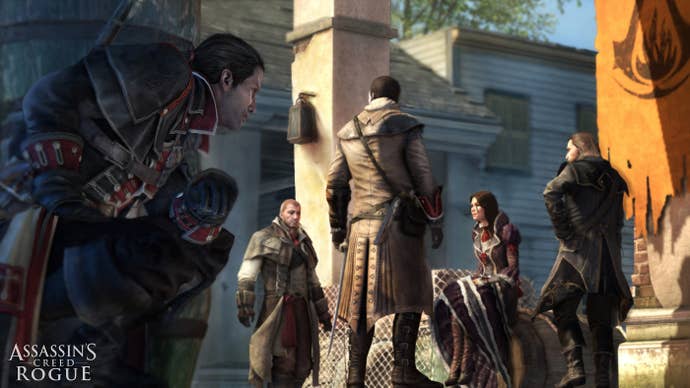
Most first impressions of Rogue come the form of: "Oh, it's Black Flag 2." It does play a great deal like Assassin's Creed IV: Black Flag. It shares the seamless naval gameplay, the first-person modern day sequences, and much of the UI with Black Flag. If you loved Black Flag and you're willing to jump back a generation graphically, Rogue will keep you satiated.
Once you move beyond the first few hours of the 10-12 hour story campaign, it becomes apparent that Assassin's Creed Rogue is the connective tissue between Assassin's Creed III and Assassin's Creed IV: Black Flag. On the narrative side it directly bridges both games in reverse order, connecting Edward's era to Connor's via three characters: Edward's former first mate Adewale, Connor's mentor Achilles, and Connor's father Haytham Kenway. You get to see two of the characters at different points in their life, while you also have the chance to explore Haytham's rise to power in the American Colonies.
On the gameplay side, Rogue brings together Black Flag's naval gameplay with the city design of Assassin's Creed III. Albany, New York is a major hub for Rogue and it feels like Connor's Boston and New York. The frontier towns you can sail to feel like the small towns in AC III, whereas the outposts and forts are almost directly out of Black Flag. You still collect Animus fragments and Shanties on foot, harpooning is still available out on the ocean. Rogue isn't Black Flag 2, it's Assassin's Creed 3.5.
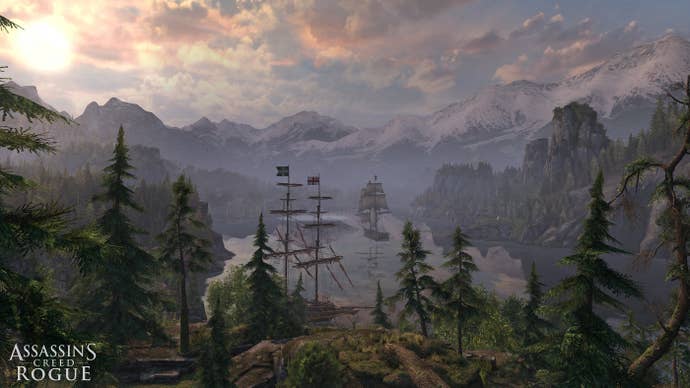
Shay has a number of new takes on old Assassin's Creed gadgets at his command: his air rifle takes the place of Edward's blowgun, firecracker darts are pulled from Freedom Cry, and the grenade launcher is simplification of Revelations' grenade system. The air rifle and grenade launcher trivalizes certain situations, just like the blowgun and grenades before them. They provide options, but if you want a harder experience, you can play without them. Hunting and skinning is still on the table as your primary form of health and capacity upgrades for your Templar.
Shay captains the small, speedy Morrigan, but the cold waters of the North Atlantic means you have to contend with icebergs, frozen shipwrecks, and ice sheets in addition to other ships and harpooning targets. All that ice also means Shay can't take a swim like Edward, because doing so causes you to slowly freeze to death.
All this isn't to say that Ubisoft Sofia melded both games together and called it a day. You may be hunting the Assassins, but they're hunting you too. On foot, this plays out in the new Stalker system. When you're doing your city parkour, you'll occasionally hear whispers and the edges of your screen will go white. This means that there's an assassin nearby. Switching over to Eagle Vision gives you a new position indicator, which you then use to find your hidden prey. Get too close and the assassin will strike, doing a big chunk of damage and running away; your job is to find them and kill them first.
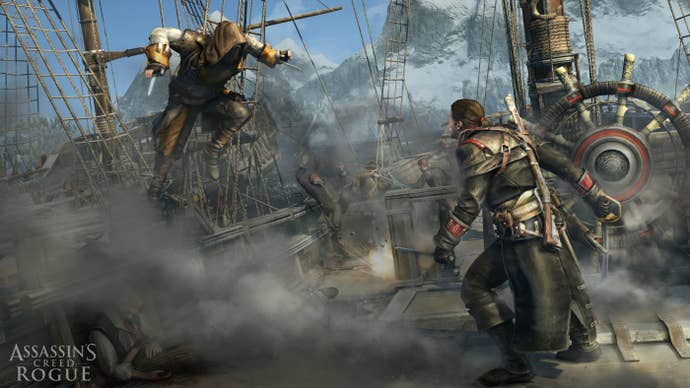
The problem is the system is spotty. Sometimes it works really well, other times its more of an annoyance. Identifying hidden assassins either didn't work at times or only happens from a specific vantage point. I'd be on a roof, sure that my opponent was on a bench below, but I couldn't get the camera in the right position to identify my target. Or I could see my target hiding in some bushes, but the Eagle Vision indicator wouldn't turn red so I could track them. At some point, I just ignored the Eagle Vision part completely; when assassins strike, you have time to counter-kill them. I just relied on my reflexes instead of playing the cat-and-mouse game, something I doubt Ubisoft Sofia intended.
On the high seas, assassin attacks work out better. You could board ships in Black Flag, but now certain ships will board you and their assassin captains will try to take your ship. It's a small change, but one that works rather well. The frequency of such ships isn't tuned high enough that it's annoying.
The base renovation system that began in Assassin's Creed II also finds its way into Rogue in expanded form. You can improve certain buildings in Albany and other small towns around the world. Like other titles, more improvements means more money flowing into your bank. One big change is these improvements require the same materials you use to upgrade your ship, meaning those materials are at a larger premium than they were in Black Flag. In Rogue, money was rarely a problem, but I had to grind materials - especially metal - for ship improvements and new renovations.
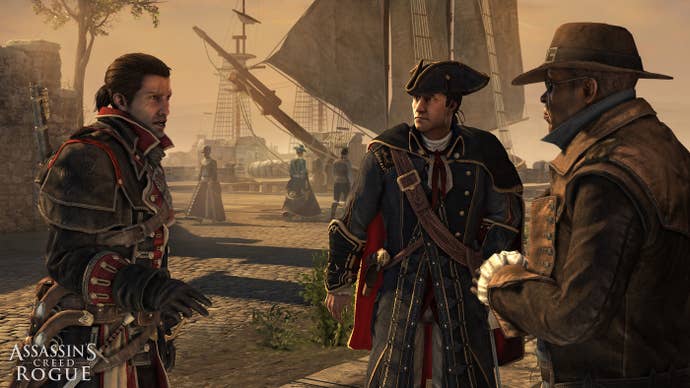
For some reason, movement in Rogue is frustrating at times. In our Unity review, Jeremy complained of missed jumps and imprecise movement, but that was never an issue for me. Perhaps my memory is spotty, but even in Black Flag, I had little problem getting around. I can't tell if it's a problem with Rogue or I just got used to the new movement system and level design of Unity, but my playthrough of Rogue had what felt like far more missed jumps and general movement frustrations. More moments where I wanted Shay to go in a direction or grab a ledge and he wouldn't, or more problems with Shay hanging on a ledge in the heat of a chase instead of leaping to the next outcropping.
Rogue also feels a bit light compared to Black Flag, but it's still a full retail release. The campaign is well-paced, but rather short, and there's no multiplayer to be found. If you're not big into exploring, unlocking new towns, renovations, and hunting, Rogue may not justify its $60 price tag.
On the Xbox 360 version, I also had a persistent sound bug, where voices would cut out for a split second. I'm not sure if that's inherent to the game, or an issue due to my game footage recording setup.
Assassin's Creed Rogue is a solid entry in the franchise, one that stands alongside Assassin's Creed Unity, if for different reasons. It's a solid mix of what came before, with a few aesthetic and mechanical changes to make it slightly fresh. If you tired of Black Flag, the only thing Rogue has to offer is a Templar-centric story. If you loved Black Flag, here's more of that with a bit of Assassin's Creed III thrown in the pot. If you're picking up Unity and Rogue, you should start here. In the end, Rogue not only closes out the Kenway Trilogy in decent style, but it also provides a great look at the foes players have been fighting for six games now.
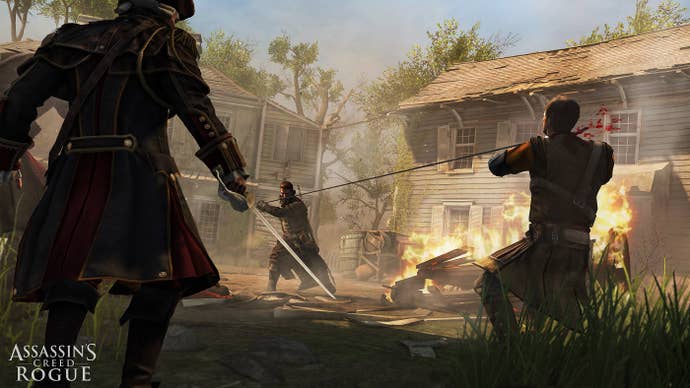
VisualsRogue's visuals are largely the same as Assassin's Creed IV: Black Flag. No improvements here.
SoundYou can expect epic Irish-themed music and brand-new shanties to entertain you during your quest.
InterfaceThis is Black Flag's interface, down to every cursor and sound.
Lasting AppealOnce you've finished the short campaign, there's more to explore and collect. Otherwise, the game's mostly over.
ConclusionWhile Unity shot for the stars and missed a bit, Rogue is content with keeping its feet on the ground. It's a game made from bits and pieces of Assassin's Creed games you've played before and the only thing that elevates it beyond that is the unique story focus. Despite that, Rogue is solid entry in the franchise and a fitting capstone on the Kenway Trilogy of games.

